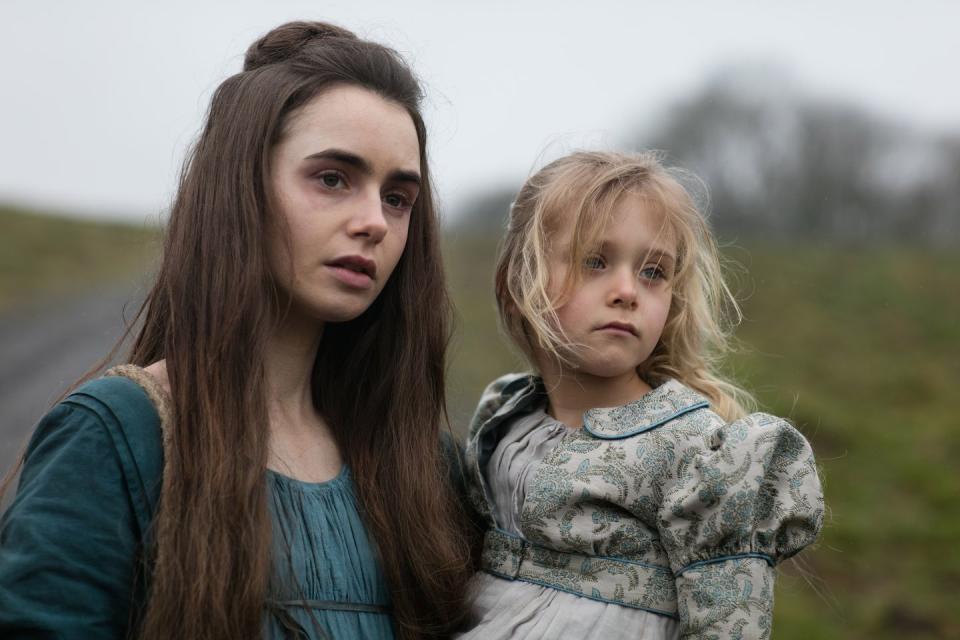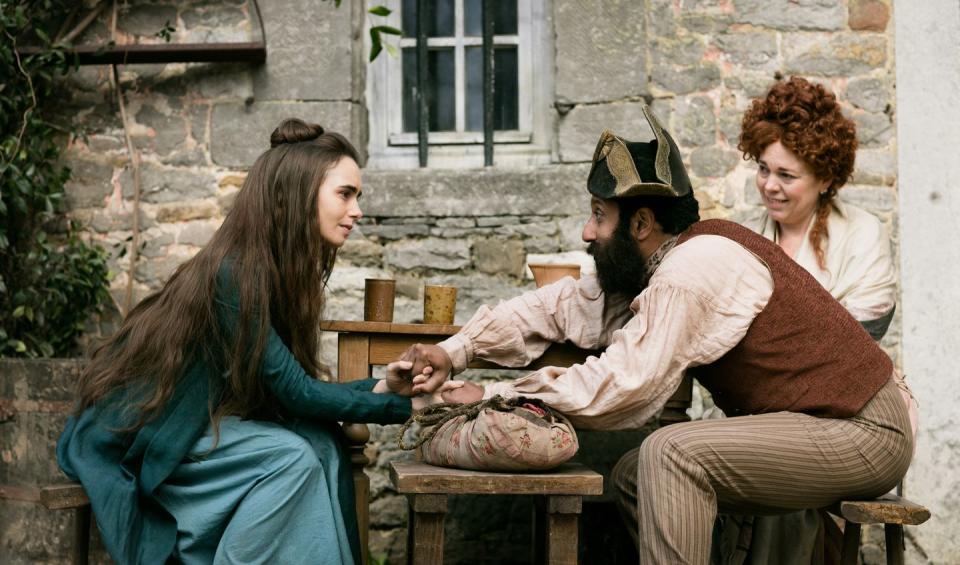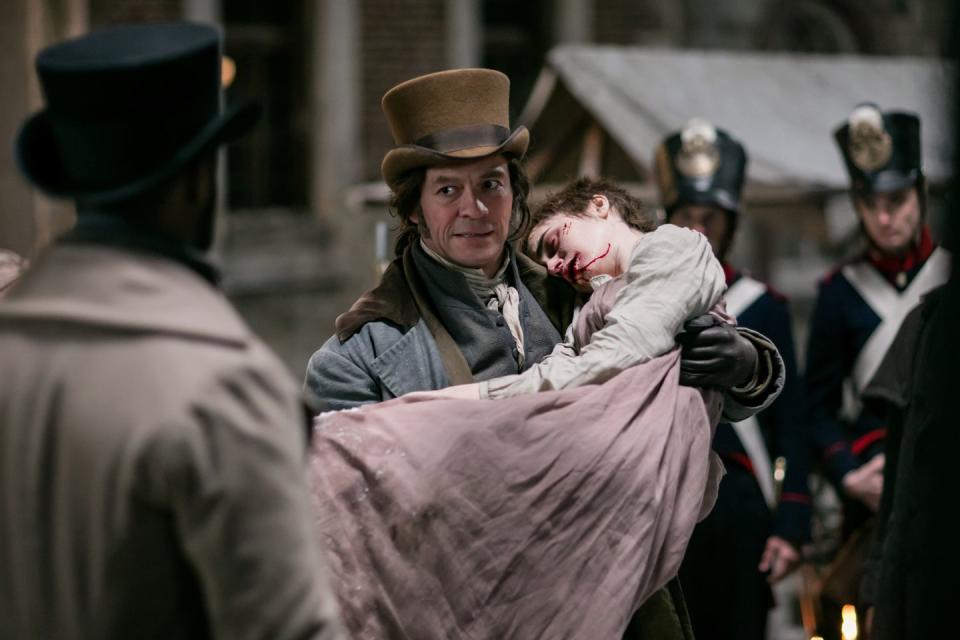Lily Collins Is Sorry Her Les Misérables Tooth-Pulling Scene Made People Want to Vomit

Lily Collins walks into the room barefoot, stilettos in hand. She's all done up-her marathon of publicity appearances today must include a shoot or two-but she's not about to wear the heels any longer than she has to.
As she settles in, an ambulance roars by. "Welcome to New York," she says. "The sound effects are brilliant." Collins pauses, then adds, "Fantine needed more of these ambulances around."
Quality medical care would indeed have helped Fantine, Collins's ill-fated character in the new Masterpiece PBS adaptation of Les Misérables. In just half of the miniseries's six episodes, Fantine goes from smitten young Parisian to a desperate sex worker, on the brink of death. Below, Collins opens up about what it was like to inhabit the iconic role, the longevity of Les Mis, and shooting in conditions so cold, her lips turned blue.

What's it like playing a character who goes from happy and in love to fighting for her life?
Sometimes, the experiences that scare me the most are the ones that I end up just feeling so proud of, because it’s like [sighs], you can breathe a sigh of relief when it’s done. But it was daunting to say the least to really take it there.
We shot it out of order for my character, so my second day of filming was my death scene. And then I worked my way back to life throughout the shoot... But it was an incredibly vulnerable, raw experience for me, that left me feeling very proud of what we had all accomplished, but also just really prepared for whatever was coming my way next. I felt like the moments that I was the most nervous [about], were scenes that needed me to go places I’d never gone before. And the second that I did it, I felt like, "Oh, okay, I could do this again."
Aside from the range of emotions you got to play, why were you excited for this role?
Well, it’s kind of-not even kind of-it’s an iconic role. And it was really the first time that audiences get to see [Les Misérables] without music dictating the storyline, and for me playing Fantine... There have been song lyrics and songs about her past, and having a child, falling in love, being wooed, and being tricked and deceived, and all that. But you don’t really get to see that personified as much. So the idea that I got to be a part of a project that has been around for so long, and people feel they know so well, but show it in this new light was a really exciting opportunity.

Do you remember the first time you saw any adaptation of Les Mis, on stage or on screen?
Oh my god. I’ve been exposed to the West End and Broadway for so long... I just remember never not seeing Les Mis. It’s such an iconic poster, and it’s everywhere. It’s on all the T-shirts; it’s on all the advertisements... So it’s been a part of my aura, like around, for so many years.
And I have friends that were in the musical film, and so I felt invested for them in that process, and it’s just never not been there. I just never thought I’d have an opportunity to be a part of it.
Why do you think this story has stuck with us for so long?
I think because the novel deals with all class systems, it has international appeal, it deals with standing up for oneself, revolution, seeking redemption, a moral compass, first young love, everlasting love.
It has so many themes, that I think it doesn’t matter what age you are, whether it’s told in the 1800s, 1900s, 2000s; if you’re male, female... And for me, again, part of the appeal was that I found such relatable things in the character of Fantine. There are ways that we’re similar, and very many ways in which we’re different. I think that there’s multiple characters that you can relate to in so many ways. And Les Mis will probably always be that way.

I heard that the conditions on set were sometimes a little extreme-
Yeah. As real as we could make them.
Was that helpful? Or just distracting and uncomfortable?
You know, I tend to try to use my surroundings or environment-or whatever is thrown my way-to my advantage, because it’s going to happen regardless, and you need to just roll with it. So when we were outside shooting the climactic scene, [in which] my character is being dragged through the streets, and thrown on the ground and fighting for her life, I was thrown around on cobblestones. It was snowing and wet. It was minus I think 13 or 14 degrees. I’m wearing limited clothing, I have no hair and teeth. And it’s like 3 in the morning. Emotions are high; we’re exhausted, it’s freezing. I don’t remember ever being that cold.
But, I mean, it’s real. Fantine was in an awful situation in her life. She was probably freezing like that every minute of her life, every moment of every day, once she got to that point. She was in physical pain, she was in emotional pain. So I just thought, "Wow, this is great. I can just kind of add to what I’m already feeling, and my lips turn blue it’s because I’m genuinely freezing."

How did you prepare for the hair-cutting and teeth-pulling scene?
Well, the guy that plays the teeth-puller, Ron, is so lovely and funny. Some of those scenes that are the most difficult to shoot, not just in Les Mis, but for me in general, have been with other actors that are just so opposite to their character; they’re so nurturing and loving, and lovely human beings, and then they just turn it on. You know, we both just turn it on. And then you watch it, and you’re like, "Oh, they’re so evil, but they’re not, because the second they yelled 'cut' they were laughing."
But to be honest, knowing what I ended up looking like, because we shot out of order, I could picture where I was headed. The set design was so incredible, and the attention to detail in that little caravan was so immaculate and it was so creepy… You just, you felt dirty, and you felt like you were in it. And having Ron the teeth-puller and hair-cutter just staring at you-I mean it all adds to the experience.
I know that when it came out in the UK they said people had to turn it off because they felt like they were going to throw up. I was, “Ooh, got a great reaction! I’m so sorry, but thank you!”
('You Might Also Like',)

